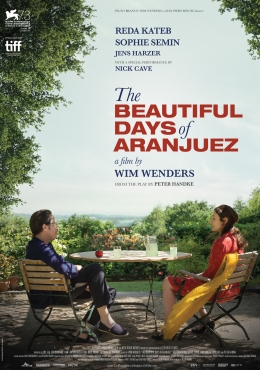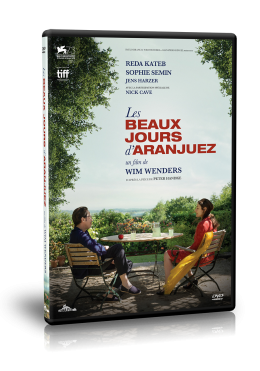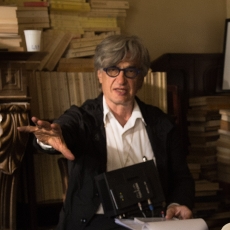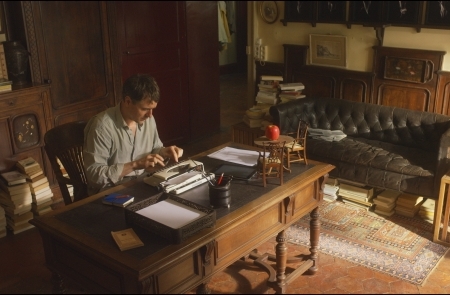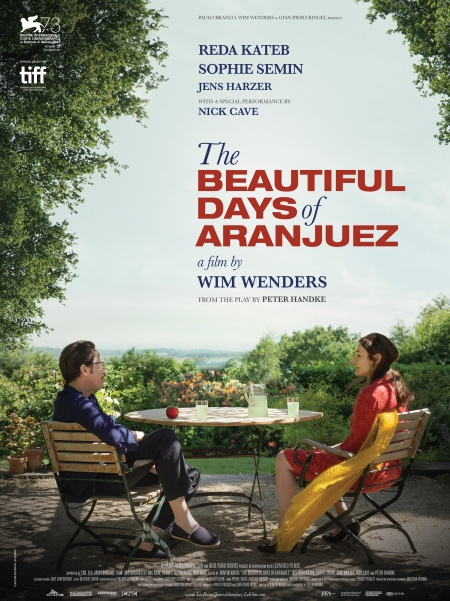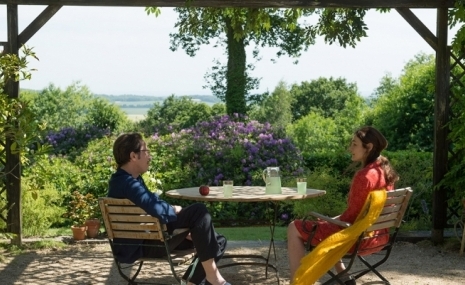INTRODUCTION NOTE
If I look at all my films, I see two extremely different categories or principles at work.
There are those that came into being strictly in the shooting process, largely made without a screenplay,
as an adventure that cast and crew went into with me.
(And those are not just documentaries, but also fictional films.)
And on the other side there are those that were planned minutely from beginning to end, down to every detail,
following a firm storyline or based on a novel.
Between those two opposites there are many shades and variations, and it seems to me that I tried each and every intermediate form.
But one thing is for sure:
I never made a film like “The Beautiful Days of Aranjuez”.
Not just because it is based on a text written for the stage,
not just because it is spoken in French,
not just because it is shot in “Natural Depth” 3D,
not just because it takes place in one single location,
not just because it was produced in just ten days,
no,
mainly because it is my first film whose wishful thinking actually became its final shape.
As a director today, in the preliminary stage of a production, you have to write a “Director’s Intention”, for the financing, the public funding or the possible distributors.
In that paper you’re supposed to present, as honestly as possible, how you see the finished film and how you anticipate to shape it.
Most of the time you never want to see (or be haunted by) that text again, as in the course of the preparation and the shoot a film emerges that differs from that first projection, either willingly or due to circumstances, cast, budget, weather, locations or whatsoever.
“Firstly, things turn out differently, and secondly, as you think” seems a good rule of thumb for filmmaking.
In this case - for the first time - I publish my “Director’s Intention” in the press book, because – for the first time – I have nothing against confronting the wish or desire for a film, its existence as sheer imagination, to the actual film that came out of it.
DIRECTOR'S STATEMENT
Peter Handke calls this text "A Summer Dialogue".
He wrote it in French for the stage, and the play has already been performed in Germany and France.
I would like to make “The Beautiful Days of Aranjuez” as a film, and shoot it entirely outdoors.
The play itself and the author have encouraged me to do so.
Allow me to explain myself in more detail.
The text deals with two characters, a woman and a man, who may not be a couple (anymore?), but have clearly known each other for a long time.
They are sitting at a table, in a garden or a park, surrounded by trees through which, from time to time, the wind blows.
In the plain below, fields are stretching out, and far in the distance you see the city of Paris.
lt is summertime...
With a few hesitant words, a long conversation begins that touches on many things:
on the woman's first sexual experiences about which the man seems to be endlessly curious, on observations suggested and provoked by the nature around them,
or on memories they both ponder about.
Sometimes it’s like a game of questions and answers, sometimes it’s a fast back and forth debate
and sometimes it leads to longer soliloquies.
And then there are also long pauses and silences.
ln that relationship between the woman and the man, but also in that summery dialogue there is great freedom, serenity and peace.
This is almost a utopian situation, considering how long this peace lasts.
(Well, not quite until the end...)
As we will be shooting out in the open, the wind will play a part, and so will sunlight and shadows.
We will hear the twittering of birds, the rustling of leaves in the treetops and sometimes a plane in the sky.
Time goes by.
And it does so differently than it could ever go by on stage.
In my imagination, or my wishful thinking, you’ll have the feeling that it is not only one day that goes by, but many;
a somehow indefinite "summer time".
For a while, the morning light might shine, then perhaps a soft rain has set in, and the two are sitting at their table under a big umbrella, listening to the sound of raindrops, then here they are, sitting in the evening sun, then under a cloudy sky again, and suddenly it is twilight, then again a glaring light...
We will move on slowly through the play, every day a bit further along, without worrying about a continuity of weather or light.
On the contrary: our only continuity is the flow of language and thoughts.
It will be helpful for the transitions that sometimes in the course of our film, (definitely at the beginning and at the end,) we will go inside the house in front of which our summer dialogue is taking place.
This is an ancient house, built in the late nineteenth century.
Sarah Bernhard had lived here for a while, it was her country residence, set on the only hill for miles around, hence this view stretching all the way to Paris...
From the garden, a big open door leads into a dark hall.
Inside, in the semi-darkness, stands a neon-lit jukebox.
A open door leads to the study of the "author".
Like "the woman" and "the man" outside, he is also played by an actor.
He is the third member of our cast, and I take a liberty with him:
there is no such character in the theatre play...
From his desk in front of the window, the author has a good view of the garden and the little terrace where the woman and the man are sitting.
When we see him for the first time, in the beginning of our film, behind his desk, using a pencil to write down on the still blank pages of his notebook the initial description of the situation, - as the opening text of the play does -
we will hear his inner voice that will lead us into this summer dialogue.
As we look with him through the window into the garden, there is no one to be seen, though.
The woman and the man "do no exist yet".
The camera moves away from our writer (while we still hear his inner voice), crosses the hall and finds its way into the open, and only now, when it discovers the table on the terrace, the woman and the man are sitting there.
When they start exchanging their first remarks, hesitantly, these first words may simultaneously be heard from the inner voice of the author, that will then fade gradually and flowingly into the dialogue between the actors.
In the middle of our summer dialogue, during a pause in the conversation between the woman and the man,
we will come back to the author, who’ll pause in his writing and will get up to select a song in the jukebox in the hall.
The actors hear the music in the distance, but their dialogue goes on undeterred.
Also at the end, after the last words by the actor, we return once again inside the house
and find the workplace of the author empty.
As we look outside the window, also the actors are gone and the table stands there empty...
So there will be a certain, sparse interplay between our couple and the author who invents them and who’s in the process of making up their dialogue.
I intend to shoot this long, peaceful, utopian conversation strictly outdoors, in nature, with all the original sounds.
And after my experiences with "Pina", "Cathedrals of Culture" and "Every Thing Will Be Fine", I also want to shoot "Les Beaux Jours d'Aranjuez" in 3D.
lf you have seen one of my films in 3D, you know that this has nothing in common with the kind of 3D you see in American films.
Our process, "Natural Depth", invented by the great European pioneer Alain Derobe, is not based on effects,
but strictly on the principle of imitating with two cameras, as precisely as possible, what (and how) two eyes see.
And after a few minutes you’ll all forget that you ever saw a film differently in the cinema.
I am confident that this way, with this great text by Peter Handke, a beautiful, peaceful and unique film can be crafted,
that I want to shoot with a small team and with sparse financial means, in two weeks in June.
I thank you for your attention.
Wim Wenders
ABOUT THE MUSIC
That was the “Director’s Intention”, a few months before the shoot.
What amazes me most, reading this again, is that the film in spite of its deliberate limitation (10 shooting days)
and its complex technology (3D) took place in a climate of freedom like I never witnessed it on a set.
(One cause was certainly that Paolo Branco, our producer, was so relaxed and never uptight about anything.)
We didn’t lack a thing, neither in terms of time nor in creative choices.
And of course there was still a lot of space for improvisation and changes.
(And I don’t just mean that the writer is no longer using a pencil, but is now working on a typewriter.)
The only thing I didn’t quite know yet then was in which direction the score was going to develop.
Okay, all music was supposed to come out of the jukebox, (and the Wurlitzer was an homage, anyway, to Peter Handke’s “Essay on the Jukebox”.)
In his text of this “summer dialogue” two references to music appear.
“Man of Constant Sorrow” an old blues classic, is quoted by the woman as “Woman of Constant Sorrow”
who she feels she represents. Peter handed me that on a plate, I figured.
Many musicians have covered the song, Bob Dylan among them, but I rather wanted to hear it afresh.
My friend Till Hertling took up the challenge and recorded a very coherent, rather contemporary version of the tune.
And then, in the play, the woman and the man quote a song by the Troggs, “Love Is All Around”.
(An old jukebox favorite of Peter Handke’s, as I remember well from those days when one used to spend more money on feeding the music box than for the drinks you’d consume in that café or bar.)
Sophie and Reda, my two actors, had to first learn the song in order to be able to quote and hum it.
I can do it in my sleep. (And Peter, too, I guess.)
But our writer, when he takes a time-out, goes to the jukebox a few times, and so the big question came up: what are his other choices?
Already when I imagined for the first time a neon-lit Wurlitzer in the dark corridor of the Sarah Bernhardt villa,
the idea came up, or rather the desire, that a song could first be heard from the jukebox, and then its singer would magically appear there, in the semi-darkness.
I probably always took these (by now outdated) music machines as some kind of “projectors” that could put a piece of music with its lyrics, but also its singer, right in front of you, so that you might (almost) see them.
A couple of weeks before we started to shoot I went to a Nick Cave concert, at the “Grand Rex” in Paris.
At the end, Nick played a few songs solo, and I was most impressed by a love song, “Into my arms”, that I knew well, but that really moved me, just performed by Nick alone, at the piano.
It made me think of my dream of the mysterious Wurlitzer appearance and all of a sudden it was obvious who that should be:
this very song and its singer (and author).
That Nick Cave accepted my invitation so spontaneously was something I had hoped for, but it was still a great delight.
I didn’t really tell my small crew why I had a grand piano delivered to the house that barely fit through the old doors of the corridor.
They were quite speechless, when Nick Cave stepped out of the car on the second last day.
(And kept playing for all of them after the shoot had finished.)
What other tunes the writer selected in his jukebox remained in the dark during the filming and was only decided in the editing room.
One song imposed itself almost on its own.
We had recorded it a year ago for the restoration of “The Goalie’s Anxiety at the Penalty Kick”, the first film in my long collaboration with Peter Handke.
In “The Goalie” many a jukebox appears, and in one of them I had an Elvis Presley song make a short appearance.
Boy, did I ever regret my juvenile carelessness later!
That song turned out to be totally unaffordable
when it came to reacquiring all music rights anew.
If we didn’t want to take out the scene altogether
we had to replace it with a new recording of our own,
with a song that had to fit the Elvis one spot-on, in rhythm and timing, so we could exchange it digitally and slip it into the old mono-mix without a trace.
Gemma Ray masterfully achieved that with, Half Way to Paradise“, but the song was way too beautiful and it seemed a real pity to just let it appear for 15 seconds.
Now it shines in its full length, in mono, of course, a Wurlitzer song par excellence.
And then there was still the question of the opening and ending music. To remain consistent, those had to come out of the music box as well…
For the first eerie images of the film of the Paris streets devoid of humanity and for the glorious summer day that our story begins on, I had a hard time finding a poignant song. (“Summer in the City” would have been too much on the nose…)
But then I rather thought: “Whose voice would I want to hear here the most?”
Immediately Lou Reed came to mind and right away “Perfect Day” just could no be topped,
at least not to my ears, an almost archetypal jukebox song in its ironic serenity.
To hear the opening of the film for the first time with Lou’s voice was probably my favorite moment during the entire editing and postproduction phase.
What remained was the ending.
Which song coming out of the jukebox could carry and support that, this apocalypse, this deep hole into which our writer is falling?
Which song could tell of his grief and his pain, but still maintain all the beauty that he imagined as well,
especially the love that the text often discards and that remains present nevertheless?
I must admit, I tried out a lot and had many songs come out of the jukebox until I found the one and only, the ultimate one, in my book, that could not have been written better “to measure” for the film:
"The World is on Fire" by Gus Black, from his album "The Day I Realized..."
With this song the neon-lit jukebox finally turned into some sort of “Greek Chorus”, a singing accompanist to the action of our film.
"Hey, hey, hey,
there’s nothing left to say,
the world is on fire,
and I love you, I love you..."

